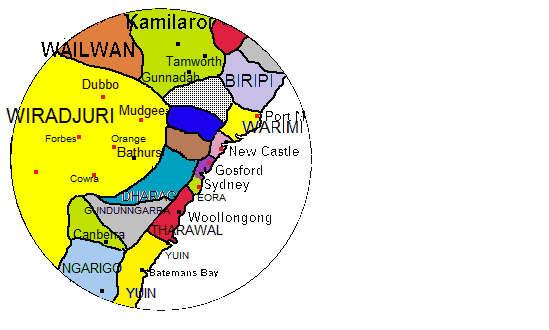Gathang Language on:
[Wikipedia]
[Google]
[Amazon]
Worimi (also spelt Warrimay), or Gadjang (also spelt ''Kattang, Kutthung, Gadhang, Gadang, Gathang'') is an
 Worimi is most closely related to
Worimi is most closely related to
Bibliography of Worimi people and language resources
at the
Aboriginal Language the Kutthung
Worimi languages Indigenous Australian languages in New South Wales {{ia-lang-stub
Australian Aboriginal language
The Indigenous languages of Australia number in the hundreds, the precise number being quite uncertain, although there is a range of estimates from a minimum of around 250 (using the technical definition of 'language' as non-mutually intellig ...
. It is the traditional language of the Worimi people, whose descendants now speak English. Work has started on revitalising the language with a dictionary and TAFE course in Gathang.
Classification
 Worimi is most closely related to
Worimi is most closely related to Awabakal
The Awabakal people , are those Aboriginal Australians who identify with or are descended from the Awabakal tribe and its clans, Indigenous to the coastal area of what is now known as the Hunter Region of New South Wales. Their traditional t ...
, in the Yuin–Kuric group of Pama–Nyungan.
Bowern (2011) considers Gadjang, Worimi, and Birrpayi to be separate languages.
Phonology
Vowels
There is also the diphthong "ay", pronounced jConsonants
Within theorthography
An orthography is a set of conventions for writing a language, including norms of spelling, hyphenation, capitalization, word breaks, emphasis, and punctuation.
Most transnational languages in the modern period have a writing system, and mo ...
, both voiceless and voiced stops are written, words begin with voiced stops only and only voiced stops may occur in consonant clusters or suffixes. There is some inconsistency in the orthography to choice of stop intervocalically, the dictionary/grammar written by Amanda Lissarrague prescribes voiceless stops intervocalically, but this is violated many times such as in ''magu'' - axe. The phonemes /p/ and /b/ may contrast, such as ''gaparr'' - baby, boy, and ''gabarr'' - head. This is unclear.
There is some evidence of a merger of the dental and palatal stops/ nasals, with free variation existing in many words, such as ''djinggarr~dhinggarr'' - silver, grey.
At the end of a word, a nasal may also be pronounced as its corresponding stop. (E.g. ''bakan~bakat'' - rock).
Intervocalically, "b" may be pronounced as
References
* * * *External links
Bibliography of Worimi people and language resources
at the
Australian Institute of Aboriginal and Torres Strait Islander Studies
The Australian Institute of Aboriginal and Torres Strait Islander Studies (AIATSIS), established as the Australian Institute of Aboriginal Studies (AIAS) in 1964, is an independent Australian Government statutory authority. It is a collecting, ...
Aboriginal Language the Kutthung
Worimi languages Indigenous Australian languages in New South Wales {{ia-lang-stub